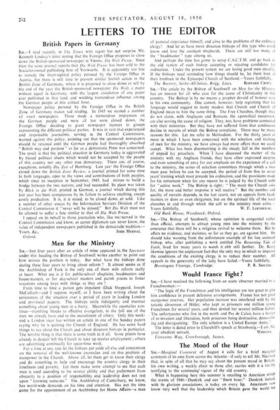Men for the Ministry
SIR,—Just four years after an article of mine appeared in,the Spectator under this heading the Bishop of Southwell writes another to point out how serious the position is today. But what have the bishops done during these four years to bring about reform ? It almost seems as if the Archbishop of York is the only one of them with reform really at heart. What use is it for public-school chaplains, headmasters and house-masters, or for day-school masters and parish priests to foster vocations among boys with things as they are ?
From time to time a parson gets impatient (Dick Sheppard, Joseph McCulloch—and I suppose myself, as I have been writing about the seriousness of the situation over a period of years in leading London and provincial papers). The bishops smile indulgently and murmur something about young men in a hurry. Meanwhile the anomalies con- tinue—stumbling blocks to effective evangelism, to the full use of the men we already have and to the recruitment of others. Only this week- end a London vicar has written an article in one of the Sunday papers saying why he is quitting the Church of England. He has some hard things to say about the Church and about diocesan bishops in particular. The terrible thing is that there is some truth in it all. Some priests have already in despair left the Church to take up secular employment ; others are advertising continually for spare-time work.
For a time at any rate let the bishops put aside all else and concentrate on the removal of the well-known anomalies and on this problem of manpower in the Church. Above all, let them get to know their clergy and do something to help and encourage the country clergy in their loneliness and poverty. Let them make some attempt to see that each man is used according to his several ability and that preferment from obscurity to a position of 'responsibility and leadership does not rest upon " knowing someone." The Archbishop of Canterbury, we knoii, has world-wide demands on his time and attention. Has not the time Come for the appointment of an Archbishop for Home Affairs—a man
of pastoral experience himself, and alive to the problems of the ordinary clergy? And let us have more diocesan bishops of this type who could know and love the assisyit shepherds. There are still too many of the " headmaster " type among us.
And perhaps the time has some to scrap C.A.C.T.M. and go back to the old system of each bishop accepting or rejecting candidates for ordination. Under the present system we are losing good men steadily. If the bishops need reminding how things should be, let them look at their brethren in the Episcopal Church of Scotland.—Yours faithfully,


































 Previous page
Previous page